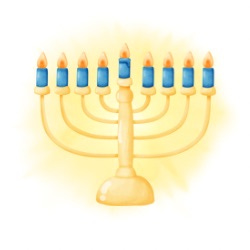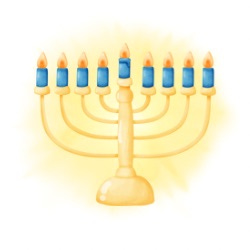Happy Hanukkah, the second holiday in our season of light! Last night, on the eve of Christmas day, the Hebrew feast of Hanukkah began. Hanukkah is an eight-day feast also known as the Feast of Dedication or Festival of Lights. It is not one of the Levitical feasts but started after the rededication of the Temple in 165 B.C. Why did the feast of Hanukkah begin?
Many events happened in the lives of God’s people, from the close of our Old Testament to the opening verses in Matthew. It was during this period that Hanukkah began. From 336 to 165 B.C., the Greeks invaded the land. Alexander the Great led the Greeks to conquer the Persian Empire. The land from Egypt to India remained under their control until just before Jesus was born, when it fell into the hands of the Romans. Upon Alexander the Great’s death, four generals took control of the empire and divided it into four kingdoms. Eventually, Israel fell under the control of an evil, anti-Christ tyrant named Antiochus Theos Epiphanes. Antiochus defiled the Temple with pig blood, ended daily offerings, and dedicated the Temple to Zeus. When Alexander was in power, he ushered in Greek culture directly opposed to Hebraic culture and the Torah. Antiochus oppressively enforced the Greek culture by shifting their attention away from God to sports, beauty, art, and philosophy.
Antiochus set his sights on Egypt, but he punished Israel when he failed to conquer that territory. He invaded Jerusalem on a Sabbath and began to terrorize the people. He outlawed the Law of Moses and the Hebrew lifestyle, putting to death anyone who worshiped God or studied the Torah. He brutally murdered those who performed circumcision, chose to keep the Sabbath, or ate kosher. Jews were being tortured, murdered, and forced to eat pork against their beliefs.
In the midst of the destruction and persecution, a priest by the name of Mattathias arose and took a stand. After a compromised priest offered a pig on the altar, Mattathias took a sword and killed him. He then led a revolt against Antiochus with a few brave men. These men were the Maccabees. Succeeded by his son Judah, the Maccabees fought for three years, and they were finally victorious in 165 B.C. when God gave them victory over Antiochus’s soldiers. The Maccabees reclaimed the Temple and dedicated it back to God. They cleansed the Temple, built a new altar and furniture, and hung new curtains before the Holy of Holies.
To celebrate the rededication, the people decided to celebrate for eight days because they had missed the eight-day celebration of the Feasts of Tabernacles. Although they only had a one-day supply of olive oil to light the menorah, the oil lasted a miraculous eight days—long enough for the priests to make more. This was a true celebration for Israel. If the Maccabees had not won, a people would not have been left to birth the Messiah.
As believers in Yeshua, we can celebrate Hanukkah as a statement of the victory light has over darkness. As disciples of Christ, we live in a daily battle between light and dark, the ways of God’s kingdom, and the ways of the world. We live in a Greek-minded culture that elevates the same idols as those introduced to Israel during the time of Alexander the Great. Sports, beauty, art, and philosophy are modern-day gods we still serve and worship in the culture and the Church. But just like a righteous remnant arose to take a stand against such things, so it is today.
Light always overcomes darkness. Light overcame darkness during the Maccabees' time so the Messiah could be born. Light will overcome darkness today as well! This is what Hanukkah is all about!
Blessings,
Brandee





